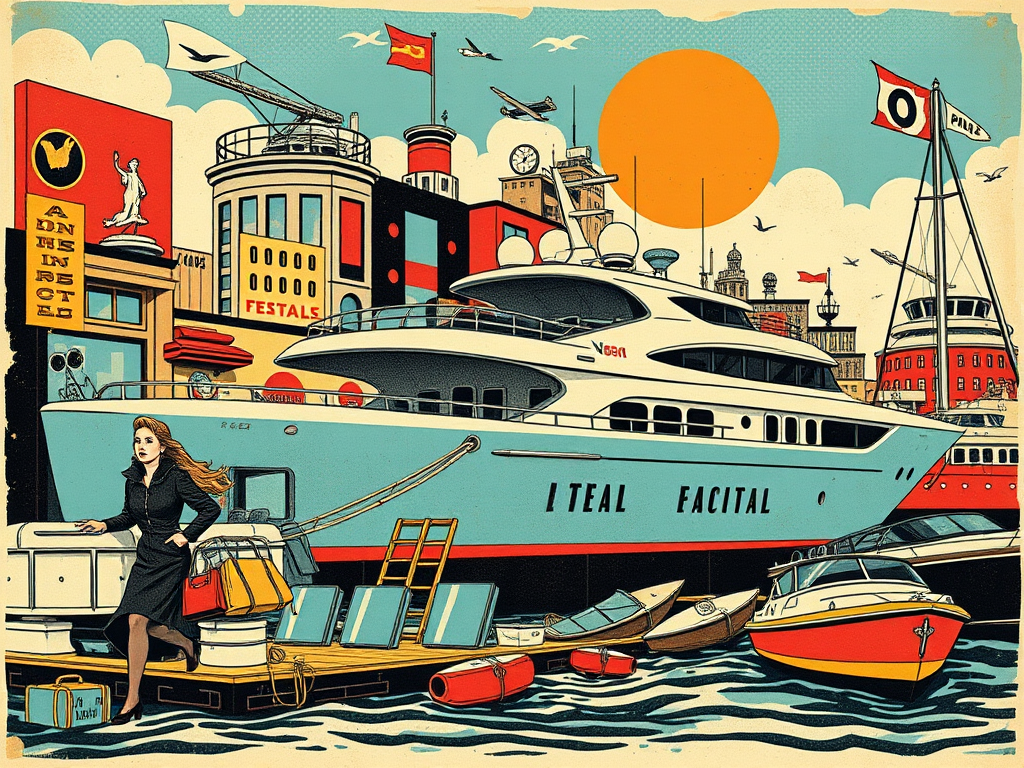
Luxury Market in Greece: High-End Retail, Yachts, and Services for the Elite
Reading time: 15 minutes
Table of Contents
- Introduction
- The Greek Luxury Landscape
- High-End Retail in Greece
- Yacht Industry and Maritime Luxury
- Elite Services and Experiences
- Real Estate: The Ultimate Luxury Asset
- Economic Impact of Luxury Markets
- Future Trends and Projections
- Challenges and Opportunities
- Conclusion
- FAQs
Introduction
Greece, a country renowned for its rich history, breathtaking landscapes, and Mediterranean charm, has emerged as a significant player in the global luxury market. This comprehensive analysis delves into the multifaceted luxury sector in Greece, exploring high-end retail, the burgeoning yacht industry, elite services, and the pivotal role of luxury real estate. As we navigate through this economic ecosystem, we’ll uncover the intricate dynamics that drive Greece’s luxury market and its impact on the broader economy.
The Greek Luxury Landscape
The luxury market in Greece has shown remarkable resilience and growth, even in the face of economic challenges. This sector’s performance is a testament to the country’s enduring appeal to high-net-worth individuals (HNWIs) and the global elite. Key factors contributing to this resilience include:
- Unique geographical advantages
- Rich cultural heritage
- Exclusive experiences and products
- Strategic positioning in the Mediterranean
These elements combine to create a luxury ecosystem that caters to discerning clientele from around the world, driving economic growth and international investment.
High-End Retail in Greece
Greece’s high-end retail sector has undergone significant transformation in recent years, adapting to global trends while maintaining its distinct Mediterranean flair. This evolution is evident in several key areas:
Luxury Shopping Districts
Athens, the epicenter of Greek luxury retail, boasts several upscale shopping areas:
- Voukourestiou Street: Home to flagship stores of international luxury brands
- Kolonaki: An exclusive neighborhood featuring high-end boutiques and designer showrooms
- Golden Hall: A premium shopping center offering a curated selection of luxury brands
These districts have become destinations in their own right, attracting both local elites and international tourists seeking premium shopping experiences.
International Brand Presence
The presence of global luxury brands in Greece has intensified, with many establishing or expanding their footprint in the country. This influx includes:
- Fashion houses like Louis Vuitton, Gucci, and Hermès
- High-end jewelers such as Cartier and Bulgari
- Luxury watch brands including Rolex and Omega
These brands not only cater to local affluent consumers but also capitalize on Greece’s tourism industry, targeting wealthy visitors from around the globe.
Local Luxury Brands
Alongside international names, Greek luxury brands have carved out a niche in the market:
- Zeus+Dione: A fashion brand celebrating Greek craftsmanship
- Zolotas: A renowned Greek jewelry house with a rich heritage
- Ergon Foods: Offering premium Greek gastronomy products
These homegrown luxury brands leverage Greece’s cultural heritage and artisanal traditions, appealing to consumers seeking authentic, high-quality Greek products.
Yacht Industry and Maritime Luxury
Greece’s extensive coastline and numerous islands make it a natural hub for the luxury yacht industry. This sector has seen substantial growth and investment in recent years:
Yacht Charter Market
The Greek yacht charter market has experienced a boom, driven by:
- Increased demand for exclusive, private travel experiences
- The allure of exploring Greece’s 6,000 islands and islets
- A growing fleet of high-end charter yachts
This market segment not only attracts wealthy tourists but also generates significant revenue through associated services and port fees.
Marinas and Infrastructure
To support the burgeoning yacht industry, Greece has invested heavily in marina infrastructure:
- Athens Marina: A state-of-the-art facility catering to superyachts
- Porto Montenegro: A luxury yacht homeport and marina village
- Flisvos Marina: One of the largest marinas in the Mediterranean
These developments have positioned Greece as a premier destination for luxury yachting, attracting both private owners and charter companies.
Yacht Manufacturing and Refit
Greece’s shipbuilding heritage has translated into a growing yacht manufacturing and refit industry:
- Custom yacht builders specializing in luxury vessels
- Refit and maintenance services for superyachts
- Collaborations with international yacht designers
This sector not only contributes to the luxury market but also supports skilled employment and technological innovation in Greece.
Elite Services and Experiences
The luxury market in Greece extends beyond tangible goods to encompass a wide array of elite services and experiences:
Luxury Hospitality
Greece’s luxury hospitality sector has seen significant growth and diversification:
- Ultra-luxury resorts on private islands
- Boutique hotels offering personalized, high-end experiences
- Exclusive villas with concierge services
These establishments cater to the most discerning travelers, offering unparalleled privacy, comfort, and bespoke services.
Gourmet Dining and Fine Wines
The Greek culinary scene has evolved to meet luxury standards:
- Michelin-starred restaurants showcasing modern Greek cuisine
- High-end wine bars featuring rare Greek and international vintages
- Exclusive food and wine tours highlighting local delicacies
This gastronomic renaissance has positioned Greece as a destination for culinary connoisseurs and wine enthusiasts.
Wellness and Spa Services
Luxury wellness experiences in Greece blend ancient traditions with modern techniques:
- Thalassotherapy centers utilizing the healing properties of seawater
- Holistic wellness retreats offering personalized health programs
- High-end spa resorts combining luxury accommodations with wellness services
These offerings cater to the growing demand for luxury wellness tourism, attracting health-conscious elites from around the world.
Real Estate: The Ultimate Luxury Asset
Luxury real estate in Greece represents a significant segment of the high-end market, offering both lifestyle and investment opportunities. The property for sale greece market has seen increased interest from international buyers, particularly in the following areas:
Prime Locations
Certain areas in Greece have become synonymous with luxury real estate:
- Mykonos: Known for its exclusive villas and celebrity appeal
- Santorini: Offering stunning cliffside properties with breathtaking views
- Athens Riviera: Emerging as a hub for high-end coastal residences
These locations combine natural beauty with proximity to amenities, making them highly sought after by luxury property buyers.
Types of Luxury Properties
The Greek luxury real estate market offers a diverse range of properties:
- Beachfront villas with private access to the sea
- Historic mansions in prestigious neighborhoods
- Ultra-modern penthouses in urban centers
- Private islands for the ultimate in exclusivity
These properties not only serve as residences but also as status symbols and investment vehicles for the global elite.
Investment Trends
Luxury real estate in Greece has attracted significant foreign investment, driven by:
- Attractive prices compared to other European luxury markets
- The Golden Visa program, offering residency in exchange for property investment
- Potential for high rental yields in tourist-heavy areas
This influx of investment has contributed to the overall growth and development of Greece’s luxury sector.
Economic Impact of Luxury Markets
The luxury market’s influence on the Greek economy is multifaceted and significant:
Direct Economic Contributions
Luxury sectors contribute directly to the economy through:
- High-value sales and transactions
- Employment in specialized, high-skill jobs
- Tax revenues from luxury goods and services
These contributions provide a substantial boost to Greece’s GDP and fiscal health.
Indirect Economic Benefits
The luxury market also generates indirect economic benefits:
- Stimulating related industries such as tourism and hospitality
- Attracting foreign investment and capital inflows
- Enhancing Greece’s international reputation as a luxury destination
These ripple effects contribute to broader economic growth and development.
Economic Resilience
The luxury market has demonstrated resilience in the face of economic challenges:
- Maintaining growth during periods of general economic downturn
- Attracting high-net-worth individuals even during global uncertainties
- Providing a stable revenue stream for the Greek economy
This resilience has made the luxury sector a valuable component of Greece’s economic strategy.
Future Trends and Projections
Looking ahead, several trends are likely to shape the future of Greece’s luxury market:
Sustainability and Eco-Luxury
The growing emphasis on sustainability is influencing the luxury sector:
- Eco-friendly luxury resorts and properties
- Sustainable luxury fashion and products
- Green technologies in yachting and maritime luxury
This trend aligns with the preferences of environmentally conscious affluent consumers.
Digital Transformation
Technology is reshaping the luxury experience in Greece:
- Virtual reality tours for luxury real estate
- AI-powered personalized luxury services
- Blockchain applications for luxury good authentication
These technological advancements are enhancing the luxury consumer experience and opening new market opportunities.
Experiential Luxury
The shift towards experiential luxury is expected to continue:
- Bespoke travel experiences and private tours
- Exclusive cultural and artistic events
- Personalized wellness and health programs
This trend caters to the desire for unique, memorable experiences among luxury consumers.
Challenges and Opportunities
While the Greek luxury market shows promise, it also faces certain challenges:
Regulatory Environment
Navigating Greece’s regulatory landscape can be complex:
- Evolving tax policies on luxury goods and properties
- Regulations surrounding foreign investment and ownership
- Environmental regulations affecting development projects
Addressing these regulatory challenges will be crucial for the sector’s continued growth.
Global Economic Uncertainties
The luxury market must remain resilient in the face of global economic fluctuations:
- Potential impacts of international economic downturns
- Currency fluctuations affecting purchasing power
- Geopolitical events influencing travel and investment patterns
Adapting to these uncertainties will be key to maintaining market stability.
Competition from Other Luxury Destinations
Greece faces competition from other luxury destinations:
- Emerging luxury markets in neighboring countries
- Established luxury hubs in Western Europe and the Middle East
- Innovative luxury offerings in Asia and the Americas
Differentiating Greece’s luxury offerings will be essential to maintaining its competitive edge.
Conclusion
Greece’s luxury market stands at a pivotal juncture, poised for continued growth and evolution. The synergy between high-end retail, yachting, elite services, and luxury real estate creates a comprehensive ecosystem that caters to the world’s most discerning consumers. As the market adapts to global trends such as sustainability and digital transformation, it also faces challenges that will require innovative solutions and strategic planning.
The resilience and adaptability demonstrated by Greece’s luxury sector, particularly in the face of economic uncertainties, underscore its importance to the country’s overall economic landscape. By leveraging its unique cultural heritage, natural beauty, and strategic location, Greece is well-positioned to solidify its status as a premier luxury destination.
As we look to the future, the Greek luxury market’s ability to balance tradition with innovation, exclusivity with sustainability, and local charm with global appeal will be key to its continued success. For investors, consumers, and policymakers alike, the Greek luxury market presents a fascinating case study in economic resilience, cultural preservation, and high-end consumer trends.
FAQs
-
Q: What makes Greece an attractive destination for luxury consumers?
A: Greece offers a unique combination of rich cultural heritage, stunning natural landscapes, exclusive experiences, and high-end products. Its Mediterranean climate, numerous islands, and strategic location also contribute to its appeal among luxury travelers and investors.
-
Q: How has the luxury real estate market in Greece evolved in recent years?
A: The luxury real estate market in Greece has seen increased foreign investment, particularly in prime locations like Mykonos, Santorini, and the Athens Riviera. The introduction of the Golden Visa program and competitive prices compared to other European markets have further boosted interest in Greek luxury properties.
-
Q: What role does sustainability play in Greece’s luxury market?
A: Sustainability is becoming increasingly important in Greece’s luxury sector. This includes eco-friendly luxury resorts, sustainable fashion and products, and green technologies in yachting. The trend aligns with growing environmental consciousness among affluent consumers and is expected to shape future developments in the Greek luxury market.
-
Q: How does the yacht industry contribute to Greece’s luxury market?
A: The yacht industry is a significant component of Greece’s luxury market. It encompasses yacht charters, marina development, and yacht manufacturing and refit services. This sector capitalizes on Greece’s extensive coastline and numerous islands, attracting high-net-worth individuals and contributing to the country’s reputation as a premier Mediterranean luxury destination.
-
Q: What challenges does Greece’s luxury market face in the coming years?
A: Key challenges include navigating a complex regulatory environment, adapting to global economic uncertainties, and maintaining competitiveness against other luxury destinations. Additionally, balancing growth with sustainability and preserving the authentic Greek experience while catering to international luxury standards will be crucial for the market’s long-term success.

Article reviewed by Marco Rossi, Private Equity Portfolio Director | Transforming Distressed Assets into High-Performance Investments, on March 31, 2025





